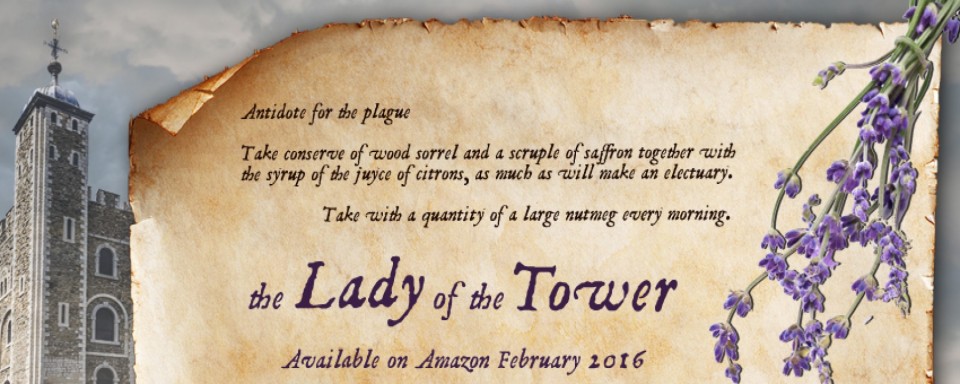PROLOGUE
God, who holds my fate in Thy hands, give me strength, I implore, for today I enter a prison like no other on this earth, and perhaps one that even Hell does not equal in its fiery despair. Give me fortitude to walk through those gates where so many traitors have gone before and never left. Give me compassion to hear the cries of forgotten men and not turn my head away. Give me, above all, Heavenly Father, courage to bear myself with dignity and Your grace when I am inwardly trembling with fear at the horrors that lie behind those walls.
Lucy
23rd March 1617
Silver drizzle veiled the stone walls rising from the moat’s stagnant water. To the north, the White Tower glistened but bade no welcome for all its shining. Gabled roofs with ornate chimneys pierced the mist and hid again, hinting a house within the fortress. I was not comforted, for it reminded me that the kept must have their keepers.
Thunder resounded through the fog from water swirling around the center arches of the bridge, just upriver from our tethered barge. The first time I was rowed in a shuddering boat through the narrow span of columns was terrifying. “Shooting the bridge” the locals called it, the currents created by the arches manifesting river water into whirlpools. Recollections of impaled traitors’ heads grinning from the pikes appeared before my closed eyes. What hell’s gate was I approaching?
“Ho! Tie here!”
A clash of metal resounded as the pikemen stood to attention on the wharf. I pulled my mind back to the present.
“Aye, make way for the lady.”
Roughened hands guided me from the rocking boat, and I carefully picked my way up the water steps. My heart beat faster as I gazed up at the sheer ramparts. They loomed over my head, broken only by a low arch with an iron portcullis. Blackened bars jutted forth, a reminder I entered a prison.
I shivered from the damp air, and not a little from apprehension, and stood still on the wharf. Behind me, the Thames ebbed now, and the ferrymen urgently called patrons to catch the running tide. In front, the moat lay impenetrably black and still. The cold seeped through the soles of my
shoes, for in my anxiety I had forgotten my pattens. Out of the gloom, a man appeared beside me.
“Princess Elizabeth paused here,” The Keeper spoke quietly, his words brushed by the lilt of an Irish accent. “She declared she was no traitor and refused to enter through that arch, for those who arrive through Traitors’ Gate do not leave again.”
The dark water gate, its walls defining the width of the ramparts above, did not welcome guests. I thought of the young princess defying her guards, perching on a wet stone on a rainy day similar to this, her own future cloudy with doubt and dread. I recalled the moment I heard I was to enter the Tower, and how my stomach twisted with fear at the news.
“When I served her, none could see the frightened girl behind the majesty,” he continued, “for we were all in love with her, each one of us outdoing the other in deeds and poetry to gain her favor.”
The Keeper waved the bargeman away, and the boat was quickly untied and pushed from the wharf, the crew not looking back as they rowed rapidly upriver.
“Her ‘adventurers,’ she called us, and all through her life, she played us one against many, declaring her affection and encouraging our competition—who could sail the farthest, dance the longest, fight the strongest.” He pulled his black leather cloak closer against the cold. “She challenged us, and she baited us like dogs to a bear.”
I looked at the Keeper, his faded blue seafarer’s eyes gazing toward invisible horizons as he sailed into memories. Briefly, I glimpsed the Queen’s man in his prime, standing tall and strong, bronzed by foreign suns, his white beard a rich chestnut brown, his shoulders broad.
“Another woman whose own sister betrayed her, who knew not whom she could trust.” My voice competed with the rushing water; there was no telling if he heard.
“All the princess recalled that sorry afternoon was her mother, who entered the gate at the king’s command and never left.” He turned away abruptly and hailed a guard standing by.Just as I am commanded.
“Escort my lady to her lodging. Ensure my steward is there to greet her and introduces her to her household. I shall be at the armory.”
He strode off, leaving me lonely on the wharf, my skirts heavy with the weight of the rain water, thoughts swirling. I followed the guard along a narrow path to a bridge across the moat and toward the gabled house I glimpsed earlier.
Married to a man I trusted not, parted from family and friends, I entered the Tower of London. A bleak March morn in the year of our Lord 1617, and I was the new mistress of the prison.
